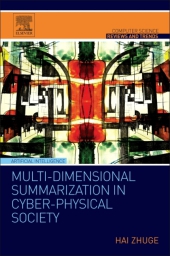 Neuerscheinungen 2016Stand: 2020-02-01 |
Schnellsuche
ISBN/Stichwort/Autor
|
Herderstraße 10
10625 Berlin
Tel.: 030 315 714 16
Fax 030 315 714 14
info@buchspektrum.de |

Hai Zhuge
Summarization, Big Data and Cyber-Physical Society
2016. 204 S. 229 mm
Verlag/Jahr: MORGAN KAUFMANN 2016
ISBN: 0-12-803455-6 (0128034556)
Neue ISBN: 978-0-12-803455-2 (9780128034552)
Preis und Lieferzeit: Bitte klicken
Text summarization has been studied for over a half century, but traditional methods process texts empirically and neglect the fundamental characteristics and principles of language use and understanding. Automatic summarization is a desirable technique for processing big data. This reference summarizes previous text summarization approaches in a multi-dimensional category space, introduces a multi-dimensional methodology for research and development, unveils the basic characteristics and principles of language use and understanding, investigates some fundamental mechanisms of summarization, studies dimensions on representations, and proposes a multi-dimensional evaluation mechanism. Investigation extends to incorporating pictures into summary and to the summarization of videos, graphs and pictures, and converges to a general summarization method. Further, some basic behaviors of summarization are studied in the complex cyber-physical-social space. Finally, a creative summarization mechanism is proposed as an effort toward the creative summarization of things, which is an open process of interactions among physical objects, data, people, and systems in cyber-physical-social space through a multi-dimensional lens of semantic computing. The author´s insights can inspire research and development of many computing areas.
The first book that proposes the method for the summarization of things in cyber-physical society through a multi-dimensional lens of semantic computing.
A transformation from the traditional application-driven research paradigm into a data-driven research paradigm for creative summarization through information modeling, cognitive modeling and knowledge modeling.
A multi-dimensional methodology for studying, managing, creating and applying methods.
1. Introduction
2. The emerging structures
3. Patterns in representation and understanding
4. The think lens
5. Multi-dimensional methodology
6. Characteristics and principles of understanding and representation
7. Implicit links in multi-dimensional space
8. General citation
9. Dimensions of summary
10. Multi-dimensional evaluation
11. Incorporating pictures into a summary
12. Summarizing videos, graphs and pictures
13. General framework of summarization
14. Summarization of things in Cyber-Physical Society
15. Limitations and challenges
16. Creative summarization
17. Conclusion
Zhuge, Hai
Hai Zhuge is a chair in computer science at Aston University and a joint professor at the Key Lab of Intelligent Information Processing at the Institute of Computing Technology in University of Chinese Academy of Sciences. Professor Zhuge is a recognized pioneer and leader of Cyber-Physical Society research and Knowledge Grid research. He has made significant contribution to semantics modelling, data modelling and knowledge modelling and management. His research has received over 5,000 citations. He is a Distinguished Scientist of ACM, a Fellow of British Computer Society, and an Associate Editor of IEEE Intelligent Systems. He previously authored The Web Resource Space Model, Springer (2008) and The Knowledge Grid -- Toward Cyber-Physical Society 2E, World Scientific Publishing Co (2012).


